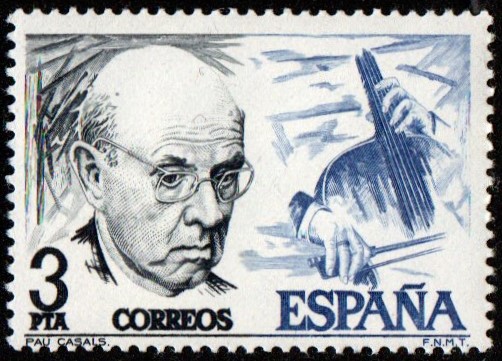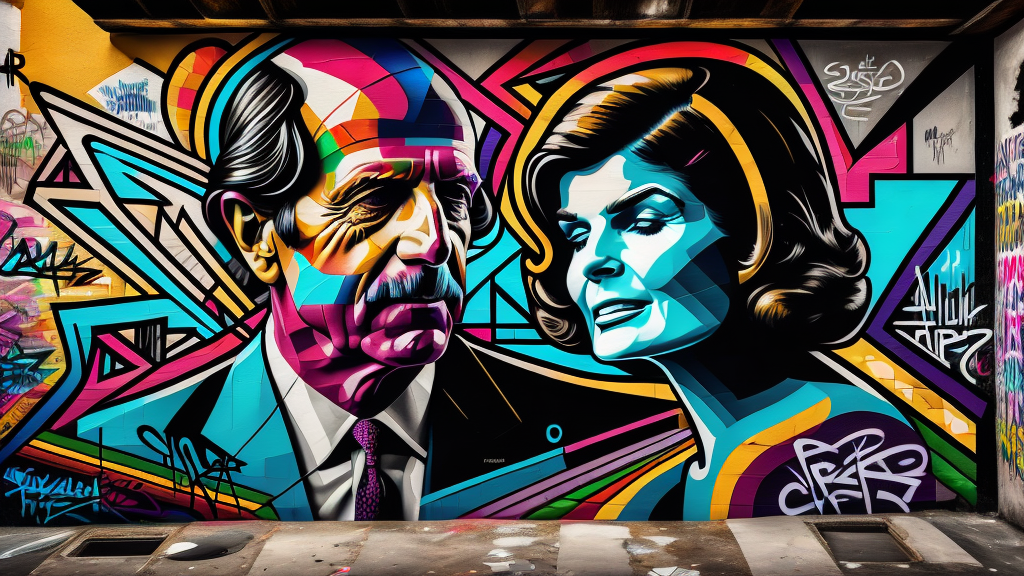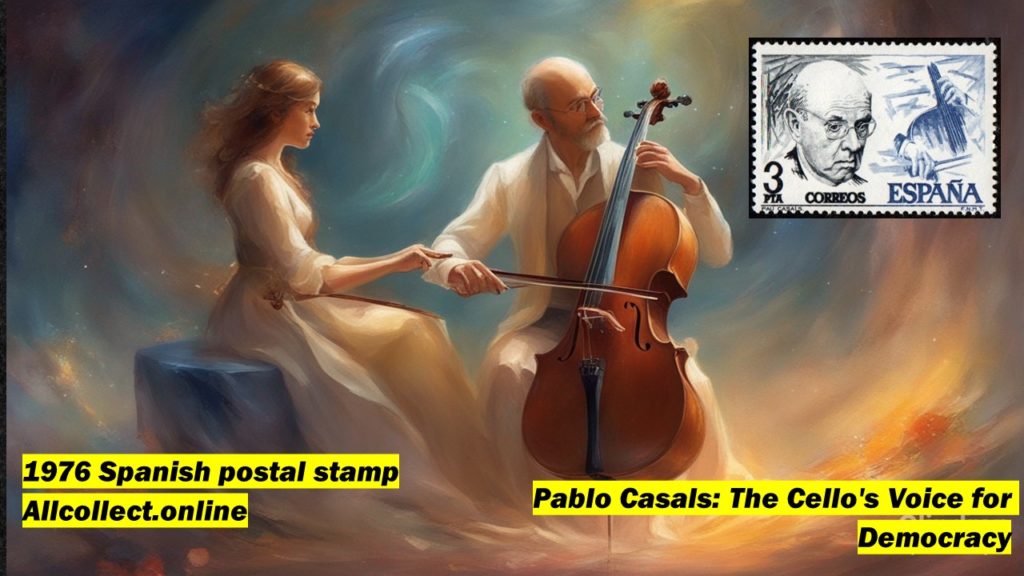Franco, Spain’s dictator, died on November 20, 1975. While historians debate the exact moment Spain embraced democracy again – some pinpoint it to the 1977 general elections, others to the adoption of Spain’s constitution in 1978 – an intriguing marker stands out in December 1976. It’s subtle, yet speaks volumes. The Spanish postage authority unveiled a stamp, producing six million copies, dedicated to Pablo Casals (or Pau Casals i Defilló in Catalan). This wasn’t just any stamp, but an homage to a world-famous cellist who had vehemently opposed Franco’s regime. Although Casals passed away at 97, two years before Franco, his legacy made a symbolic return to Spain with this stamp.

Pablo Casals, born on December 29, 1876, in El Vendrell, Spain, and passed away on October 22, 1973, in San Juan, Puerto Rico, was a renowned cellist, conductor, and composer. Often referred to as the greatest cellist of the 20th century, Casals is best known for his deeply expressive style and his virtuoso technique.
Here are some key points about his life and achievements:
- Early Life and Training: Casals began playing the cello at a young age, and by the age of eight, he was already performing. His talent quickly became evident, and he was sent to study at the Escola Municipal de Música in Barcelona and later at the Madrid Royal Conservatory.
- Discovery of Bach’s Cello Suites: One of Casals’ most famous contributions to classical music was his discovery of Johann Sebastian Bach’s Cello Suites. As a young musician, he found the then-little-known scores in a second-hand music store in Barcelona. He would go on to study and perform these suites extensively, elevating them to the central repertoire for the cello.
- International Acclaim: Casals began touring internationally in his twenties, earning acclaim across Europe and later the world. He played with many of the great musicians of his time, including violinists Eugène Ysaÿe and Fritz Kreisler.
- Stance Against Fascism: Casals was an outspoken opponent of fascism. After the Spanish Civil War and the rise of Francisco Franco’s dictatorship, Casals vowed not to return to Spain until democracy was restored. He lived in exile in France and later in Puerto Rico.
- After World War II, Casals began to perform again, most notably at the Prades Festivals, which he established in 1950 in the French town of Prades. The festivals became a significant event in the classical music calendar, attracting many leading musicians of the time.
- Later Years: In the 1950s, Casals moved to Puerto Rico, the birthplace of his mother. There, he established the Puerto Rico Symphony Orchestra and the annual Casals Festival, both of which continue to be significant cultural events on the island.
- Legacy: Casals’ influence on cello playing was profound. His approach combined technical precision with deep musicality, setting new standards for the instrument. His recordings, particularly of the Bach Cello Suites, remain landmark interpretations.
- Humanitarian Efforts: Beyond his musical contributions, Casals was known for his deep sense of humanity and his commitment to peace. He was awarded the United Nations Peace Medal in 1963 for his stance against oppression and his advocacy for peace.
In the 2016 biographical drama film “Jackie,” which revolves around the life of Jacqueline Kennedy Onassis (played by Natalie Portman) in the days following the assassination of her husband, President John F. Kennedy, there is a reference to Pablo Casals. The film offers a glimpse into the private and public life of the former First Lady during one of the most traumatic periods in American history.

Pablo Casals is not a central character in the film, but he plays a significant role in one of the film’s scenes, which is a flashback to a White House concert. In real life, Jacqueline Kennedy admired Casals and invited him to perform at the White House in 1961. This event was notable because Casals had boycotted performing in the United States for many years in protest of the country’s recognition of Francisco Franco’s Spanish regime.
In the film, this concert serves as a poignant moment, highlighting Jackie’s appreciation for arts and culture, as well as her ability to bring world-renowned artists to the White House. The scene is also a reminder of happier times in contrast to the main timeline of the movie, which deals with grief, trauma, and the weight of legacy.
Casals’ inclusion in the film underscores the cultural renaissance that the Kennedys brought to the White House, and it serves as a testament to Jackie’s influence and her efforts to elevate the arts in the United States.
Casals’ association with the UN is a testament to art’s role in global peace. Notably:
- In 1971, to mark the UN’s 26th anniversary, he performed at the General Assembly, serenading a hall of global dignitaries.
- His performance wasn’t just musical; he infused it with a call for peace, emphasizing the principles the UN stands for.
- For his undying commitment to peace, the UN honored him with the Peace Medal in 1963.
- Today, the UN remembers him not just as a master cellist, but a champion of peace and human rights.
In the expansive realm of classical music, Pablo Casals remains a towering figure, not only for his unparalleled musical contributions but also for his relentless pursuit of justice, peace, and human rights. His life serves as a testament to the transformative power of art in shaping our world.

